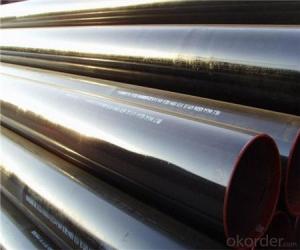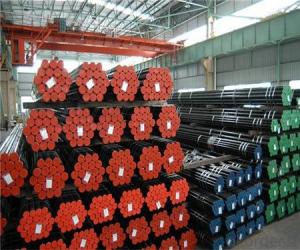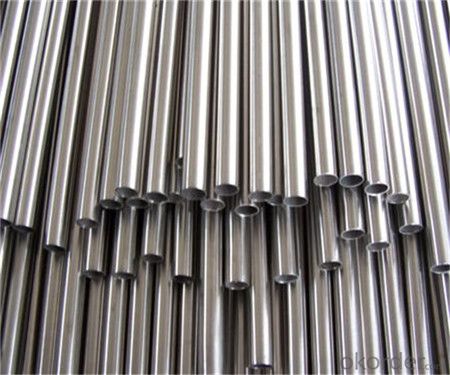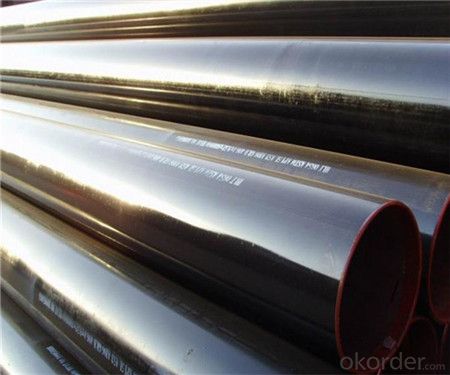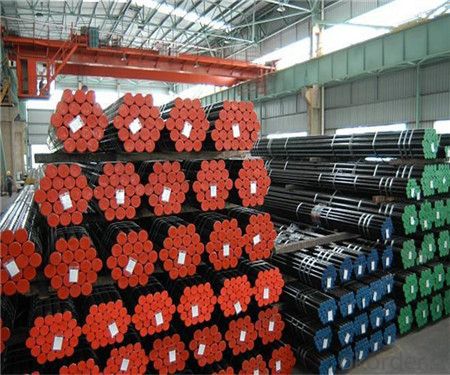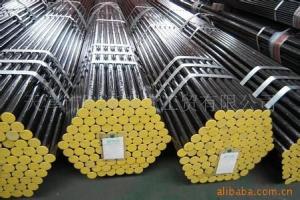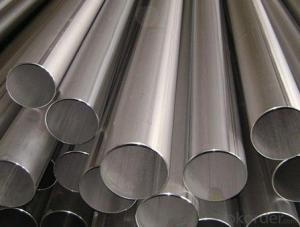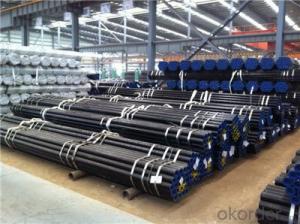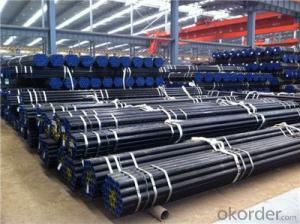Hot Selling Seamless Steel pipe Made in China from CNBM
- Loading Port:
- Tianjin
- Payment Terms:
- TT OR LC
- Min Order Qty:
- 25 m.t.
- Supply Capability:
- 2000000 m.t./month
OKorder Service Pledge
OKorder Financial Service
You Might Also Like
1、Structure of Hot Selling Seamless Steel pipe Made in China from CNBM:
Seamless pipe is formed by drawing a solid billet over a piercing rod to create the hollow shell. As the manufacturing process does not include any welding, seamless pipes are perceived to be stronger and more reliable. Historically seamless pipe was regarded as withstanding pressure better than other types, and was often more easily available than welded pipe.
2、Main Features of Hot Selling Seamless Steel pipe Made in China from CNBM:
• High manufacturing accuracy
• High strength
• Small inertia resistance
• Strong heat dissipation ability
• Good visual effect
• Reasonable price
3、Hot Selling Seamless Steel pipe Made in China from CNBM Specification:
Standard | GB, DIN, ASTM ASTM A106-2006, ASTM A53-2007 |
Grade | 10#-45#, 16Mn 10#, 20#, 45#, 16Mn |
Thickness | 8 - 33 mm |
Section Shape | Round |
Outer Diameter | 133 - 219 mm |
Place of Origin | Shandong, China (Mainland) |
Secondary Or Not | Non-secondary |
Application | Hydraulic Pipe |
Technique | Cold Drawn |
Certification | API |
Surface Treatment | factory state or painted black |
Special Pipe | API Pipe |
Alloy Or Not | Non-alloy |
Length | 5-12M |
Outer Diameter | 21.3-610mm |
Grade | 20#, 45#, Q345, API J55, API K55, API L80, API N80, API P110, A53B |
Standard | ASME, ASTM |
1) Material:20#(ASTM A 106/A53 GRB.API5LGRB,GB),45#,16Mn,10#.
2) Specification range:OD:21.3-610mm,WT:6-70mm,length:6-12m or according to the requirement of clients.
3) Excutive standards:GB,ASME API5L.ASTM A 106/A53,Despite of the above standards,we can also supply seamless steel pipe with standard of DIN,JIS,and so on,and also develop new products according to the requirements of our clients!
4) Surface:black lacquered,varnish coating or galvanized.
5) Ends:Beveled or square cut,plastic capped,painted.
6) Packing:bundles wrapped with strong steel strip,seaworthy packing.
4、Packaging & Delivery
Packaging Details: | seaworthy package,bundles wrapped with strong steel strip |
Delivery Detail: | 15-30days after received 30%TT |
5、FAQ of Hot Selling Seamless Steel pipe Made in China from CNBM:
①How is the quality of your products?
Our products are manufactured strictly according to national and internaional standard, and we take a test
on every pipe before delivered out. If you want see our quality certifications and all kinds of testing report, please just ask us for it.
Guaranteed: If products’ quality don’t accord to discription as we give or the promise before you place order, we promise 100% refund.
②How about price?
Yes, we are factory and be able to give you lowest price below market one, and we have a policy that “ for saving time and absolutely honest business attitude, we quote as lowest as possible for any customer, and discount can be given according to quantity”,if you like bargain and factory price is not low enough as you think, just don’t waste your time.Please trust the quotation we would give you, it is professional one.
③Why should you chose us?
Chose happens because of quality, then price, We can give you both.Additionally, we can also offer professional products inquiry, products knowledge train(for agents), smooth goods delivery, exellent customer solution proposals.Our service formula: good quality+good price+good service=customer’s trust
SGS test is available, customer inspection before shipping is welcome, third party inspection is no problem.
6、Hot Selling Seamless Steel pipe Made in China from CNBM Images:
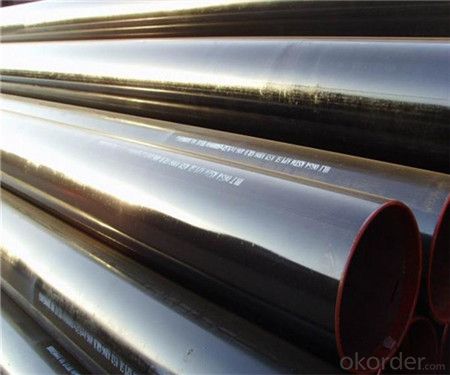
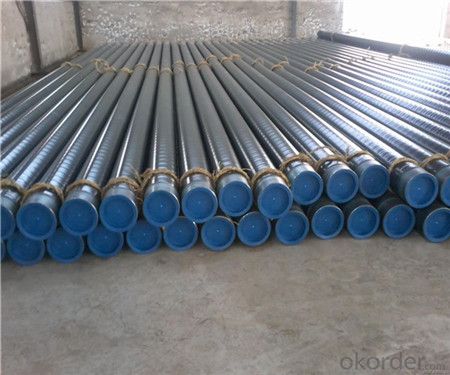
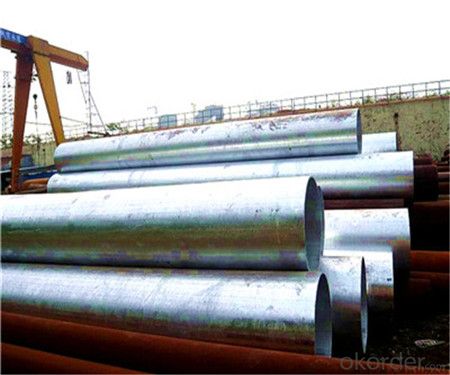
- Q: Can steel pipes be recycled?
- Yes, steel pipes can be recycled. Steel is a highly recyclable material and can be used to create new steel products, including pipes, through processes like melting and reshaping. This helps to conserve natural resources, reduce energy consumption, and minimize waste.
- Q: What is the difference between steel pipes and PVC-U pipes?
- Steel pipes and PVC-U pipes differ in terms of their composition, strength, and suitability for different applications. Steel pipes are made from iron and carbon, making them strong and durable, capable of withstanding high pressure and extreme temperatures. They are commonly used for transporting liquids and gases in industries like oil, gas, and construction. On the other hand, PVC-U pipes are made from polyvinyl chloride, a plastic material. They are lightweight, easy to install, and resistant to corrosion and chemicals. PVC-U pipes are typically used for water supply, drainage systems, and irrigation.
- Q: What is the difference between steel pipes and copper-nickel pipes?
- Steel pipes and copper-nickel pipes differ in material composition and properties. Steel pipes are primarily made from iron and carbon, which provide strength and durability. They are suitable for various applications, including plumbing, construction, and industrial purposes. On the other hand, copper-nickel pipes are composed of a combination of copper and nickel, which offer excellent corrosion resistance and thermal conductivity. These pipes are often used in marine environments, desalination plants, and offshore oil and gas industries due to their ability to withstand saltwater corrosion. Overall, the main distinction lies in their composition and specific applications based on their unique properties.
- Q: Can steel pipes be used for underground culverts?
- Yes, steel pipes can be used for underground culverts. Steel pipes are known for their strength, durability, and resistance to various environmental factors, which makes them suitable for underground applications. They can withstand heavy loads, high water pressure, and the corrosive effects of soil and water. Additionally, steel pipes are available in various sizes and thicknesses, allowing for customization to fit specific project requirements. However, it is important to consider factors such as the soil conditions, water table levels, and potential for corrosion when selecting the appropriate type of steel and protective coatings for the pipes.
- Q: How are steel pipes connected to other plumbing components?
- Steel pipes are commonly connected to other plumbing components through various methods, depending on the specific application and requirements. The most common methods of connecting steel pipes to other plumbing components include threading, welding, and using mechanical fittings. Threading is a process where the ends of the steel pipes are cut and grooves are created on the outer surface to form a threaded connection. This allows the pipes to be screwed into fittings such as elbows, tees, or couplings. Threaded connections are often used in smaller diameter pipes and low-pressure applications. Welding is another commonly used method to connect steel pipes. It involves heating the ends of the pipes and joining them together by melting the metal at the point of contact. This creates a strong and permanent connection. Welded connections are often used in larger diameter pipes and high-pressure applications. Mechanical fittings are another popular option for connecting steel pipes. These fittings are designed to be easily installed without the need for welding or threading. They typically consist of two parts – a compression ring and a nut. The compression ring is placed over the pipe, and the nut is tightened, compressing the ring onto the pipe and creating a secure connection. Mechanical fittings are commonly used in both residential and commercial plumbing systems. In addition to these methods, other connection techniques such as flanges, grooved couplings, and soldering can also be used to connect steel pipes to other plumbing components, depending on the specific needs of the system. Overall, the method used to connect steel pipes to other plumbing components depends on factors such as the size of the pipes, the pressure of the system, the type of fluid being transported, and the specific requirements of the project. It is important to choose the appropriate method and ensure that the connections are properly installed to ensure the integrity and efficiency of the plumbing system.
- Q: Can steel pipes be used for shipbuilding?
- Yes, steel pipes can be used for shipbuilding. Steel pipes are commonly used in shipbuilding due to their high strength, durability, and resistance to corrosion. They are utilized for various purposes such as structural components, piping systems, and ventilation systems in ships.
- Q: What are the advantages of using steel pipes in the manufacturing industry?
- There are several advantages of using steel pipes in the manufacturing industry. Firstly, steel pipes are known for their strength and durability, making them suitable for handling heavy loads and withstanding high pressures. Secondly, steel pipes have excellent corrosion resistance, which ensures a longer lifespan and reduces the need for frequent replacements. Additionally, steel pipes offer a smooth interior surface, allowing for efficient fluid flow and minimizing friction losses. They are also highly versatile, as they can be easily fabricated and customized to meet specific requirements. Finally, steel pipes are environmentally friendly, as they are recyclable and contribute to sustainable manufacturing practices.
- Q: Can steel pipes be used for underground water supply pipelines?
- Indeed, underground water supply pipelines can utilize steel pipes. The reason for the widespread use of steel pipes in water supply systems is their ability to endure, their strength, and their resistance to corrosion. They can withstand high levels of pressure and can accommodate large quantities of water. Furthermore, steel pipes come in a variety of sizes and thicknesses, granting flexibility in the design and installation of underground water supply pipelines. However, it is crucial to ensure that the steel pipes are appropriately coated or lined to avert corrosion and uphold the water's quality during transportation. Regular inspections and maintenance must also be carried out to prevent any potential problems with the steel pipes.
- Q: Can steel pipes be used for underground fire protection systems?
- Yes, steel pipes can be used for underground fire protection systems. Steel pipes are commonly used in underground applications due to their durability, strength, and resistance to corrosion. They provide an effective means of delivering water for fire suppression in underground areas, ensuring the safety of the surrounding infrastructure.
- Q: What are the different types of steel pipe elbows?
- There are several different types of steel pipe elbows, including 45-degree elbows, 90-degree elbows, and 180-degree elbows. These elbows are used to change the direction of the flow in a piping system and are available in various sizes and materials to suit different applications and requirements.
Send your message to us
Hot Selling Seamless Steel pipe Made in China from CNBM
- Loading Port:
- Tianjin
- Payment Terms:
- TT OR LC
- Min Order Qty:
- 25 m.t.
- Supply Capability:
- 2000000 m.t./month
OKorder Service Pledge
OKorder Financial Service
Similar products
Hot products
Hot Searches
Related keywords

